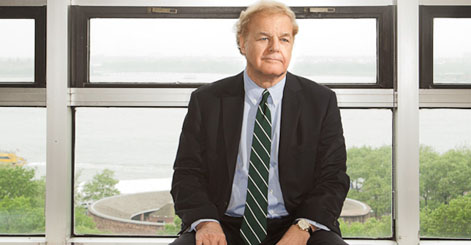If a brokerage firm is in bankruptcy trouble, James Giddens, head of Hughes Hubbard's corporate reorganization and bankruptcy group, usually finds himself in the middle of it. In recent years, with financial titans such as Lehman Brothers falling prey to the global financial crisis, Giddens’ services have been in high demand.
The Securities Investors Protection Corporation (SIPC) has selected Giddens to be Trustee on several of the largest liquidations in history. For example, when Lehman Brothers filed for bankruptcy in 2008, he was appointed by the SIPC to oversee the liquidation of the investment bank’s multibillion dollar assets. In June 2011, his firm managed to wrestle back an estimated $4.8 billion in assets from Barclays.
Recently, Giddens has been appointed to handle the liquidation of another headline-grabbing case, MF Global, Inc.
Lawdragon: You’ve been appointed as trustee in some of the largest corporate bankruptcy cases in history. What is the secret to being successful in this area?
James Giddens: Expertise in broker-dealer and financial service firm liquidations. I have been involved with the Securities Investor Protection Corporation since its creation in 1970 and the enactment of the Securities Investor Protection Act. I recently served as a member of the “SIPC Modernization Task Force,” whose report was submitted to the Board of Directors of SIPC and the public in February 2012.
LD: What makes some bankruptcy cases more complicated and challenging than others?
JG: I am the Trustee for the liquidation of MF Global, Inc., the broker-dealer, and Lehman Brothers, Inc., the broker-dealer. As Trustee, I manage the conduct of the liquidations, including marshalling assets and paying creditors. Both these cases involve separate and distinct proceedings in multiple jurisdictions world-wide with different legal approaches to insolvency. I find these cross border issues among the most challenging, and fascinating, areas of the practice today.
LD: In litigation over commercial disputes there are clear winners and losers. In your view, what would you consider a successful bankruptcy case?
JG: A successful bankruptcy case is one in which creditors realize the maximum value that is possible for their claims in a reasonable time, be it through liquidation, a sale of assets or a successful, reorganized on-going business. Litigation in my view is not necessarily zero sum; in bankruptcy the effort is often best spent for creditors making the best of a bad situation, and preserving value for all stakeholders.
LD: What’s the most frustrating aspect of your job?
JG: The “gamesmanship” of some parties seeking to elevate their interests at the expense of others without recognition that a fair solution might require some consideration of public interest or compromise.
LD: Do you consider the Lehman bankruptcy one of the more unique or challenging cases you’ve handled? If so, in what respect?
JG: Yes, absolutely. The liquidation of Lehman Brothers, Inc. involved the administration of more than $140 billion in assets and the analysis and adjudication of claims involving virtually every major financial institution in the world.
LD: What skills are important for bankruptcy lawyers to have?
JG: Patience, intelligence and empathy for the divergent stake-holders.


